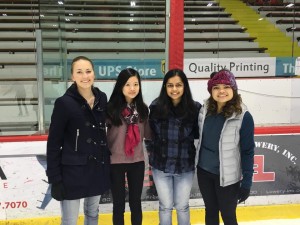Let me start by saying that I LOVED Professor Henderson, I loved the program, and I thoroughly regret the fact that not more people signed up for such an incredible event.
Prof. Henderson got us talking about privilege – a topic that simultaneously nobody and everybody wants to talk about. I admit that it was very uncomfortable for me at first, being that I, thankfully, have never experienced discrimination. I felt as though my opinions were not valid, and therefore didn’t deserve to be voiced.
I couldn’t have been more wrong.
Professor Henderson made me feel more than welcome to speak my mind, and I finally got off my chest the types of things that have been bothering me for so long. I would constantly negate what I had said, saying it was “petty” or “invalid” and every time, she would correct me and remind me that it was a safe space.
So much love. So much respect.
I really wish I could have stayed for the whole presentation. Truly inspirational, and would definitely recommend to everyone. Please come back, Professor!!!

